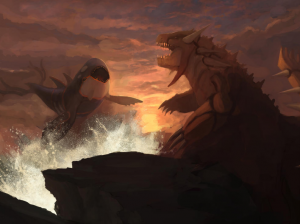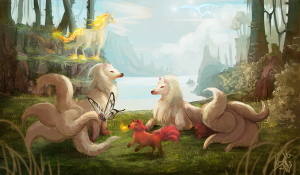Going Beneath the Surface
Impossible Country, as Korea has often been called, has intrigued and astounded researchers, tourists, and historians alike for centuries.
My own personal (and somewhat limited) experience with this unique and dynamic country comes from living there for 3+ years as a Native English Teacher (NET) from the United States.
At around the 2.5 year mark, I started seeking out books that would deepen my understanding of the mysterious country even more. I found a highly recommended one, with both positive and negative aspects, written by an Englishman, Simon Winchester, titled, Korea: A Walk Through the Land of Miracles.
Winchester set out on foot from Korea’s southern tip to the North Korean border in the late 1980’s.
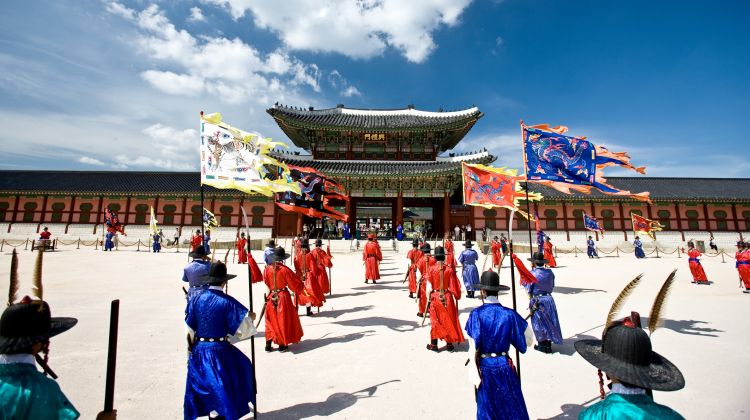
Simon Winchester’s Korea
Most, if not all of the things I will relay below stem from Simon’s understanding of Korea during that time. Korea is likely a very different place today. I am not writing this to spark political or religious debate or to cause any debate at all, but to merely reflect on what I read and learned having lived here and having read Simon’s account of Korea in the 1980’s. I wanted to report the things that I found interesting, unique, or culturally dynamic (though some will be outdated) and put them all in one place.
Miss Park Choon-sil, interpreter and friend of Simon Winchester, upon meeting him said many times that [she was eager that her country, so little known abroad and of such uncertain reputation, should be better and more sympathetically understood out in the English speaking world.]
It was Simon Winchester’s hope, and it is my hope too. Here are 36 facts and observations off the beaten path.
36 Little Known Facts about Korea
The Angibu
1. The Korean secret police, tappers of phones, followers of dissidents, and beaters-up of radicals are known as the angibu pg. 88
Meat good for the libido
2. Many Koreans believe that eating dog is good for the libido and increases stamina pg. 85 (this varies greatly by location, and the younger generation now have different ideas about this)
3. Korean protocol of introducing someone can be quite cumbersome but also quite useful. For example, to a westerner, Mr. Kim would introduce his wife as Mrs. Kim. If she introduced herself to say a shopkeeper, she would say Mrs. Choe (Choe is her maiden name) – Choe Mi-young. But to Mrs. Kim, she would neither be Mrs. Kim nor Mrs. Choe. She would instead be, the mother of the family’s eldest son. Introduced as ‘Kyu-Hwan eum-ma, Kyu-Hwan’s mother. Pg 76
No import necessary
4. “Having seen the rice planters working so hard earlier in the day, and now watching these tennis players competing in so deadly a fashion and with such talent, bloodless determination, I found myself thinking—tangential though the thought might at first seem—about the extraordinary success of every one if Korea’s recent ambitions. How triumphant the country had become from utter ruin in the 1950s to the world’s fastest growing economy in the 1980s!
And much of that success, I fancied, had come about because of sheer will-power and concentrated effort that the Korean people apply to any venture the undertake—they play tennis hard, well, and to win; they build ships day and night, at lower prices and in greater numbers to beat the competition; they work their fields at an exhausting pace to make quite certain their fellow people want for nothing in their diet, and so that the nation has to import nothing—no food, anyway—from abroad.” Pg 73-74
5. Yi Sun-shin was an admiral in the Royal Korean Navy of the sixteenth century. He is revered today as the man who, almost alone, administered a series of stunning defeats to the Japanese and proved that Koreans are capable of seeing off the ambitions of their most loathsome neighbors, if only they really try.” pg, 64
6. The Japanese made their first concerted attack on Korea in the spring of 1592, when the warlord Hideyoshi Toyotomi sent an army of 150,000 men storming through the peninsula on their way to China—Korea being thought of by the Japanese as merely a springboard or a convenient walk-way for the acquisition of the larger prize. pg. 64
I’ll huff and I’ll puff and I’ll blow your thatched roof down
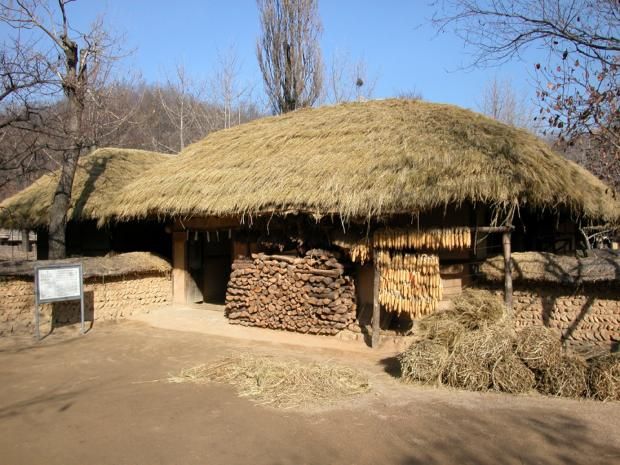
7. President Park decreed that thatched roofs were a stigma of underdevelopment and ordered a nationwide campaign to replace thatch with tile. Most thatch has gone from Korea, but here down in Jeolla, where they are said to loathe the government with vigor and venom, a lot of it has stayed, both as a defiant symbol of Jeolla independence and because it is warm, cheap, and handsome. Pg 100
8. Simon’s Winchesters thoughts about Korea and their attitude toward the ‘dignity of poverty.’ “The Koreans are an ambitious, hardworking people, perhaps more hardworking than any I have ever encountered and ever will. They want to improve their lot, and also desperately, to improve their children’s lot. They will work all the hours God gives them to provide a good education for their offspring—no sacrifice is too much for a Korean father to make, no hours too long for a Korean mother to work, if only the child is well educated, is given a better chance, a better series of opportunities.” Pg 101
The Kwangu Uprising, and other names
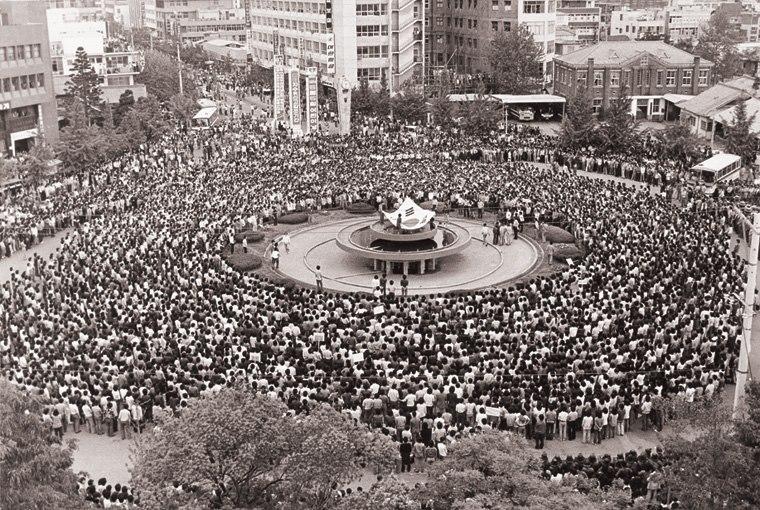
9. Whether you call it the Kwangju uprising, the Kwangju massacre, the Kwangju rebellion, or the Kwangju incident, depends entirely on where you stand in Korean politics. Wherever you stand, the events of those seven days in May 1980 have left scars on the Korean psyche like no event since the 1950 war. pg 105
Faction name: Abnegation
10. The Confucian deal, in a society like Korea’s where Confucianism is still widely followed, is a simple one: if people will agree to forget their individuality and concentrate on their duties, then they can be guaranteed that they will be treated with respect and kindness by all. Self-abnegation is bargained, in other words, for universal respect. Happiness is to be gained through human things, coming to terms with oneself, one’s family, one’s community.” Pg 119
11. The two systems, the material and the Confucian sit uneasily together. Which, then, is the better of the two systems? Is a life of self-abnegation, respect for others, a sense of duty, and correct behavior more worthy than a life of self-assertion, of total freedom, of ‘looking out for Number One’? Or, put another way, is a society that is liberally stuffed with Edisons and Fords and Einsteins, and with depressives and murderers and alcoholics—is that approaching the ideal? Or do we have a more fulfilled society when all is carefully structured social harmony, where the jen and the yi, the yin and the yang, are in-near perfect equilibrium, where no one raises his voice, and every parent is revered by every child, where the elders are cared for, children are adored, imagination and innovation and invention are feared rather than favoured, and the individual is forgotten? Pg, 120
Our language is our own: Hangul

12. Korean is a Ural-Altaic language – linguistically connected (though only rather vaguely) to Turkish, Mongolian, Finnish, and Magyar. Chinese, on the other hand, is a Sino-Tibetan tongue, with ties to Burmese and Thai and Tibetan. In 1420 King Sejong began working on a system that would allow Koreans to not only speak, but also read and write their language. Until then, nothing existed. Using Chinese characters to express Korean sounds would be like using Chinese to express English—it is technically possible, but is also clumsy, useless and philosophically out of whack. Pg 129
13. On December 25th, 1443, King Sejong, 4th king of the Yi Dynasty unveiled a new script for which Koreans would use to write. It was to be known as Hun min chong um – The Correct Sounds for the Instruction of the People. (An odd title for a supposedly simple script: he changed it three years later to hangul, which means ‘the Korean Writing.’” Pg. 130
14. Confucianism lays great emphasis on the group, on togetherness. Solitude is not a Korean pleasure. Pg 134
Monks who marry
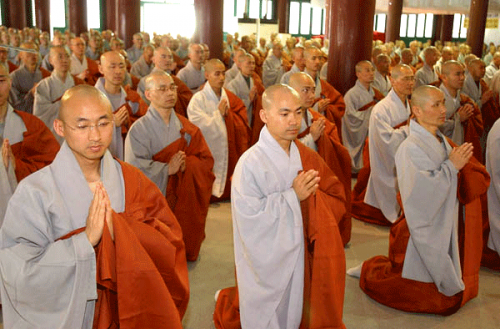
15. Japanese colonial masters had introduced the notion of married monks to Korea; it was all part of the Japanese grand design to do all they could to lessen the cultural and religious differences between the two countries, as part of their moral rationale for having carried out their annexation. Pg. 137
16. Ondol – the Korean house-heating system, consists of a series of flues that carry the hot gases from the kitchen range beneath the floor. It is a very cheap and efficient system and is also used in Afghanistan. Pg. 139
Look Ma, two hands!
17. Everything in Korea is offered with both hands, indicating that no hand is free to aim a blow or draw a sword. Pg. 147
18. Hangeul day is celebrated and no other language day is Pg. 147
19. Ginseng is the symbol of Korea. Pg. 208
Bamboo: strong, supple, and light… oh, and good for eatin’ too
20. Bamboo is known to Koreans as taenamu, or the Great Tree, is greatly revered as it in China. It has the advantages of strength, suppleness, and lightness, so that it can be used to make scaffolding or baskets, chopsticks or tablemats, carved spoons or furniture. And its young shoots can be eaten. Pg. 157
A big deal: Hwangap
21. The hwangap is the celebration of a turning point in a person’s life, 60 years to be exact, when man or woman has passed through the five twelve-year zodiacal cycles—the yukgap—as the sixty year period is known—which constitute the proper life span of the human being. And thus a huge party is staged. Once someone has gone through this sixty year period, they retire from active life, take their respected ease as an elder, let their children make them as comfortable as they can, and let filial piety take over the reins of their life. 145 – hwangap
22. The Korean War (Jun 25, 1950 – Jul 27, 1953) is known to Koreans as the Civil War. Pg. 194
Korea: the invaded, crushed, colonized country
23. Simon Winchester writes: “Korea has spent the better part of its four thousand years being invaded, crushed, subjugated, colonized, or in other ways trampled on: all its neighbors have made good use of the little peninsula—the Chinese, the Russians, the Mongols, the Manchus, and the Japanese have all seized and invaded and wrecked according to their wants and moods. (The cynical though not wholly unreasonable view is that today’s American’s are following in the same ignoble tradition.) pg. 196-197
The three kingdoms
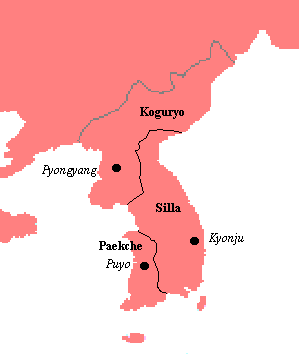
24. Some words about Korea’s three kingdoms – “At its most basic, history judgment on these three kingdoms is thus: the kings of Koguryo (who operated from Pyongyang) were warlike; those of Shilla (whose capital was Kyongju in the southeast) were skillful and ambitious (and eventually triumphant in dominating the monarchs of the other two); and the rulers of Paekche were cultured and religious. Pg. 198
25. “The noble animals—the tigers and bears for which the peninsula was once famous—have all but gone; and such is the Korean appetite for any meat that moves that, except for the odd weasel or mouse, Korean forest floors are like vast empty ballrooms, dark and quite silent.” Pg 222
26. The rose of Sharon, though not a rose (it is a type of hibiscus) is Korea’s national emblem. pg 222
27. Seoul was founded in 1392 is now the capital of South Korea. Before that, Kaesong was the capital, which now lies in the north. Pg. 235
28. O.B. a Korean beer, and one of the country’s most iconic, stands for Oriental Brewery Pg. 238
Pointless and dangerous: the mighty Han River
29. The Han River is the mightiest river in all of Korea, rival to the Yalu and the Kum and the Imjin. And now, politics have made the Han a sad sort of stream, a river that is pointless at one end and now supposedly very dangerous at the other. Pg. 239
30. In August 1910, King Sunjong, the 27th king of Korea, issued a proclamation yielding up his throne and his country to the Japanese. They had annexed his country; it fell upon his shoulders to bring an end to a dynasty that had ruled Korea, for good or ill, since 1392. Pg. 246
“Land of the Morning Calm”

31. Choson means ‘morning freshness and calm’ pg. 247
32. “Look at the villages all over Korea, and see which is the biggest and most imposing building in every one. It’ll nearly always be the school building. We worship teachers and schools here. Teachers are paid well. They are respected figures in our community. Are they still in the West? I have heard not, not as much as before. Look at the universities in Seoul—there are dozens of them. People crawl over each other to get to attend classes.
They really want to learn. They want to be trained. There is this intense desire to better themselves, and to do it with their brains if they can. If anything can be specifically thought of as responsible for our country’s success then its that—the intense desire to learn, to become properly educated at the best schools that can be afforded No matter what the cost, no matter the hardship, that’s the prime duty of a parent, to get his children educated. That’s the key.” Some words about education from a Kim Woo Choong pg. 250
Unassailable superiority
33. “The interview was short and much as I had feared. Koreans are properly proud of their country, or they are in public, at least, even if a lack of confidence, and self-pity and deep and inconsolable melancholy sometimes seem to be the national malaise—and while they find foreign attention flattering, they regard themselves as eminently deserving of it. So there is—I had been warned—a touch of condescension about their response to anyone who takes an interest in them—much as there is in Japan.
And so the interviewer asked me to speak in Korean, not to laud my efforts with the language but rather to show how badly a foreigner speaks so complicated a language. Then again, I was asked to sing a Korean song—to demonstrate how difficult it was for anyone other than a son of Chosun to tackle the mournful rhythms of the local music. No one in the interview wanted me to lose face; it wasn’t as crude as that. But I was expected to offer a display that would reassure the viewers of their unassailable superiority in all things I might attempt—and I, having been told exactly what to do, wasn’t going to disappoint them.” Simon Winchester after having walked nearly the entirety of South Korea pg 262
DMZ: Demilitarized Zone

34. The Korean Armistice Agreement—signed on 27 July 1953 in Kaesong by Marshal Kim Il Sung, supreme commander of the Korean People’s Army and by Peng The Huai, commander of the Chinese People’s Volunteers, and in Munsan by General Mark Clark, the American commander of the UN Forces, is a document that effectively created the division of the Korean peninsula into two violently opposing countries. No treaty, no concordat, no instrument of state recognized by the real world created a country called North Korea or fashioned this miracle state called South Korea. Article One of the armistice says it all:
- A Military Demarcation Line shall be fixed, and both sides shall withdraw two (2) kilometers from this line so as to establish a Demilitarized Zone between the opposing forces. A Demilitarized Zone shall be established as a buffer zone to prevent the occurrence of incidents which might lead to resumption of hostilities. The irony of the DMZ – It is 151 miles long, stretching across the country like a giant scar. Almost no humans go there—there are no farmers, no towns, few soldiers. The consequence of this is a profusion of wildlife within the zone—wildlife that is untroubled by the threat of artillery that points menacingly in its direction, since it is wise enough not to understand the threat. So all manner of birds and beasts that have vanished from the more developed parts of Korea still live within the frontier fences. The Manchurian crane, Grus japonensis, a red-capped black-wing-tipped bird of wonderful magnificence, still struts its stuff among the sedges of the DMZ; the Korean wildcat prowls beneath the arc lights; the little Korean bears—Ursus thibetanus usurious heuda—that have a white stripe down their black furry backs can also be seen grubbing for food at the edge of the minefields. It is an ironic counterpoint to the awfulness of war that so much that is beautiful are rare flourishes where the human anger is greatest, and yet in those places where peace has translated into commerce, so much loveliness has cleared away.” Pg 270
Koreans north of the line
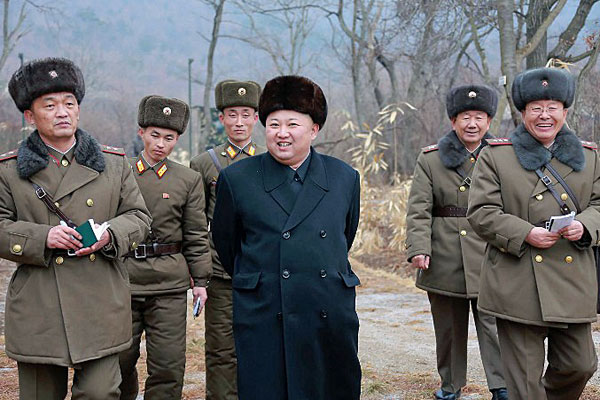
35. Winchester’s interview of a man who can never be named (for safety reasons) “But I have a suspicion. From what I have seen, and from the conversations I have had, I actually believe that the people who will think of me as a friend, and who will write to me more constantly, will be the friends, I made in North Korea. It has nothing to do with politics—I am no fan of Kim Il Sung, don’t worry.
But the people in the North seem, in a strange way, to be purer in their Koreanness. They are still gracious and kindly. There is something old-fashioned about them. There is a degree of sincerity and gentility that somehow seems to be evaporating, just a little, in the South. Many people I know in the South are too concerned with their own prosperity, with the rush of their lives, to remember their Koreanness. Perhaps it is my imagination, but I felt the Koreans north of the line were more—how shall I say it?—more unspoiled. I feel they will remain my friends for longer. Pg. 281
Weeping birds
36. Korean people say that the birds are “weeping.” Birds in Korea do not sing. They weep.
Can you add any quotes or fun facts to the list?


